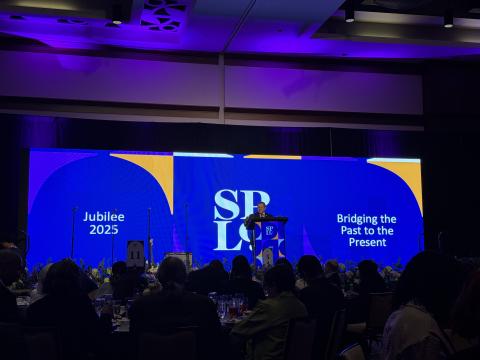Ranking Member Morelle Marks 60th Anniversary of Bloody Sunday at The Southern Poverty Law Center Jubilee Dinner
MONTGOMERY, Alabama - Rep. Joe Morelle, the top Democrat on the Committee on House Administration, marked the 60th anniversary of Bloody Sunday by delivering remarks during the Southern Poverty Law Center’s Jubilee Dinner. The following remarks were prepared for delivery.

Thank you for having me, and for that warm introduction. I am grateful to Margaret Huang and the SPLC, not only for hosting such a wonderful evening, but also for the essential work you do—now, more than ever.
I could not, and would not, speak about voting rights here in Alabama without acknowledging my colleague and dear friend, the Ranking Member of our Elections Subcommittee—a daughter of Selma—Congresswoman Terri Sewell.
Our theme this evening could not be more appropriate for the moment we find ourselves in—“Bridging the Past to the Present.”
It evokes an image of Bloody Sunday that remains seared in my mind: The steel arch of the Edmund Pettus Bridge, emblazoned with the name of a Confederate general and Ku Klux Klan leader; below, the cresting span of concrete, blanketed by hundreds of foot soldiers, legion in number and laden with spirit.
Those marchers set out—with unflinching courage and enduring hope—for Montgomery.
But their odyssey led them so much farther than the state capital: It led them into the homes and the hearts of tens of millions of Americans.
We know the struggle for voting rights for Black Americans has been a long one. In 1848, Frederick Douglass chose my hometown—Rochester, New York—to make his life; from there, he published his North Star newspaper—a beacon for justice in a dark time. Frederick Douglass was himself a bridge—a bridge that integrated ideas and people.
He connected abolitionists and suffragists, activists and presidents, guided by an ardent conviction—that governments derive “their just powers from the consent of the governed,” that no consent can be given when the ballot is barred.
From Douglass in the 19th century, we turn to Selma, in the 20th. Among the marchers was another titan, and personal hero of mine—a man I am truly humbled to have been able to call a colleague—Congressman John Lewis.
On Bloody Sunday, after a state trooper beat John to within an inch of his life, John was treated at Good Samaritan Hospital.
That hospital was run by the Sisters of Saint Joseph, who in 1940 had come to Selma—from (in a twist of fate) Frederick Douglass’s hometown of Rochester, New York.
The hospital was, I believe, the only one in the Selma area to care for Black patients. As the nuns cared for John, he took one of their hands and asked “Sister, don't you think this is a high price to pay for freedom?”
Many years later, Congressman Lewis came to Rochester and visited the sisters’ motherhouse to thank them for helping to save his life.
Like Frederick Douglass, John Lewis was a living bridge. A bridge between Bloody Sunday and the struggle for the right to vote today—a fight we know remains ferocious.
Today, we must be the bridge that supports the weight of Frederick Douglass, of John Lewis, of the foot soldiers of Bloody Sunday, of everyone who knows a bright and just future is within our reach.
Congress must pass legislation like the John R. Lewis Voting Rights Advancement Act, the Freedom to Vote Act, and the Native American Voting Rights Act.
In my position as the top Democrat on the committee of jurisdiction, along with Terri Sewell and in partnership with you all, I will work tirelessly to support you—the civil rights leaders of today—as we march forward, arm-in-arm, into a shining morning and a hopeful future.
I am confident of victory because we are in this fight together—unrelenting—until the path to freedom for every American is well-beaten and worn.
Thank you—to SPLC, to all of you—for your work, and for the time you have given me. I look forward to everything we will achieve
###
